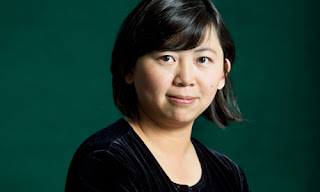Dear Friend, from my life I write to you . . . Katherine Mansfield and Yiyun Li
The writer Katherine Mansfield is one of those extraordinary authors famous as much for her personal journals as for her fiction. Her notebooks contain some her best writing, partly because when she wrote in them she wasn't bound by the constraints of narrative or publication as they were perceived at the time. She was experimenting (not always successfully), exploring her motivations and the very darkest aspects of her own psyche. Hampered by illness, often on her own, her journal became her closest companion and recipient of her most intimate thoughts.
The Chinese author, Yiyun Li, admits being influenced by Katherine Mansfield to a considerable degree. Her latest memoir takes its title from a line in KM's journal, 'Dear Friend, from my life I write to you in your life'. Like Mansfield Yiyun Li has a problem with identity. She is Chinese, American, a writer, a scientist, a daughter, a sister, a mother, a wife, a friend, an exile, a depressive, a survivor, charting a passage through her life dragging them all in her wake. Katherine Mansfield, living in exile from her homeland, also felt a fragmentation of her personality. 'True to oneself!' she asks her journal. 'Which self? Which of my many - well, really, that's what it looks like coming to - hundreds of selves.'
Yiyun Li, brought up and educated in China, has difficulty with the 'I' word. She admits that she hates it. 'The moment that I enters my narrative my confidence crumbles'. In the Chinese language, the 'I' word is not often used and under the old regime such individualism was not encouraged. It was usual to use the impersonal pronoun, or to use 'we'. In China, Yiyun Li observes, 'Living is not an original business'. There is also considerable exposure in writing about oneself. 'To write one has to give up protection fundamentally.'
She feels that she no longer belongs anywhere and quotes another favourite author, the Irish John McGahern, with envy: 'The people and the language and landscape where I had grown up were like my breathing'. She longs to feel that, but, 'The paths I walked by myself in Beijing are gone. Even if the city had remained unchanged, I have turned away from the people and the language and the landscape'.
But Yiyun Li is 'haunted', a word which she explains is derived from the Middle English hauten (to reside, to inhabit), also from Old French hanter (to inhabit, frequent) and Old Norse heimta (to bring home, to fetch). 'When we feel haunted,' she writes, 'it is the pull of our old home we're experiencing.'
The author adopts a fragmented, journal style at the beginning of the book, morphing into longer narrative passages. The book was written after a period of suicidal despair and hospitalization - a period of self-interrogation that led to the memoir. Yiyun Li was a rebel in an institutionalized China, also in conflict with her 'wrathful and possessive' mother. She explores her relationships with her homeland, her family, with literature and the process of integration into American society. '. . . cruelty and kindness are not old stories,' she observes, 'and never will be.'
Finding Katherine Mansfield's journals was a life-changing moment for her. 'I devoured her words like thirst-quenching poison.' She read the notebooks 'to distract myself' and cried over them. 'What a long way it is from one life to another,' she observes, 'yet why write if not for that distance'?
Yiyun Li destroyed most of her own journals and letters before she left China. Others she put in sealed boxes and has never opened them. 'One crosses the border', she says, 'to become a new person.' That person speaks a new language that takes on new meanings. One English saying struck her very hard - 'To kill time'. She interpreted it differently: 'no one thinks of suicide as a courageous endeavor to kill time'. This original take on her adopted language gives her writing a very particular flavour. 'Language is capable of sinking a mind', she asserts. In renouncing the mother-tongue, a great deal gets erased from memory. This loss, she admits 'is my sorrow and my selfishness'.
As the title implies, this is a self-conscious narrative - not just 'an argument with myself' but a dialogue with an unknown, unseen reader. It is extraordinarily direct. But she states firmly that, 'A writer and a reader should never be allowed to meet. They live in different time frames. When a book takes on a life for a reader it is already dead for the writer.' From my own point of view, I'm not sure that this is true. My books are never dead to me - instead they develop rather frightening lives of their own and threaten to gallop off and become feral. And I love meeting readers to continue the dialogue that begins on the page. But I am not Yiyun Li.
This is a wonderful book and the author's self-examination is threaded through with Katherine Mansfield's equally ruthless self-analysis. It made me think critically about the art of memoir and journal-writing, as well as concepts of identity and belonging. I've also ordered Yiyun Li's volume of short stories, A Thousand Years of Good Prayers and I'm looking forward to reading it. And many thanks to my friend Mel U, who has a wonderful book blog - The Reading Life - who emailed me to tell me about this book!
 |
| Yiyun Li |
The Chinese author, Yiyun Li, admits being influenced by Katherine Mansfield to a considerable degree. Her latest memoir takes its title from a line in KM's journal, 'Dear Friend, from my life I write to you in your life'. Like Mansfield Yiyun Li has a problem with identity. She is Chinese, American, a writer, a scientist, a daughter, a sister, a mother, a wife, a friend, an exile, a depressive, a survivor, charting a passage through her life dragging them all in her wake. Katherine Mansfield, living in exile from her homeland, also felt a fragmentation of her personality. 'True to oneself!' she asks her journal. 'Which self? Which of my many - well, really, that's what it looks like coming to - hundreds of selves.'
Yiyun Li, brought up and educated in China, has difficulty with the 'I' word. She admits that she hates it. 'The moment that I enters my narrative my confidence crumbles'. In the Chinese language, the 'I' word is not often used and under the old regime such individualism was not encouraged. It was usual to use the impersonal pronoun, or to use 'we'. In China, Yiyun Li observes, 'Living is not an original business'. There is also considerable exposure in writing about oneself. 'To write one has to give up protection fundamentally.'
She feels that she no longer belongs anywhere and quotes another favourite author, the Irish John McGahern, with envy: 'The people and the language and landscape where I had grown up were like my breathing'. She longs to feel that, but, 'The paths I walked by myself in Beijing are gone. Even if the city had remained unchanged, I have turned away from the people and the language and the landscape'.
But Yiyun Li is 'haunted', a word which she explains is derived from the Middle English hauten (to reside, to inhabit), also from Old French hanter (to inhabit, frequent) and Old Norse heimta (to bring home, to fetch). 'When we feel haunted,' she writes, 'it is the pull of our old home we're experiencing.'
The author adopts a fragmented, journal style at the beginning of the book, morphing into longer narrative passages. The book was written after a period of suicidal despair and hospitalization - a period of self-interrogation that led to the memoir. Yiyun Li was a rebel in an institutionalized China, also in conflict with her 'wrathful and possessive' mother. She explores her relationships with her homeland, her family, with literature and the process of integration into American society. '. . . cruelty and kindness are not old stories,' she observes, 'and never will be.'
Finding Katherine Mansfield's journals was a life-changing moment for her. 'I devoured her words like thirst-quenching poison.' She read the notebooks 'to distract myself' and cried over them. 'What a long way it is from one life to another,' she observes, 'yet why write if not for that distance'?
 |
| Katherine Mansfield, with advanced Tuberculosis, at her desk. |
As the title implies, this is a self-conscious narrative - not just 'an argument with myself' but a dialogue with an unknown, unseen reader. It is extraordinarily direct. But she states firmly that, 'A writer and a reader should never be allowed to meet. They live in different time frames. When a book takes on a life for a reader it is already dead for the writer.' From my own point of view, I'm not sure that this is true. My books are never dead to me - instead they develop rather frightening lives of their own and threaten to gallop off and become feral. And I love meeting readers to continue the dialogue that begins on the page. But I am not Yiyun Li.
This is a wonderful book and the author's self-examination is threaded through with Katherine Mansfield's equally ruthless self-analysis. It made me think critically about the art of memoir and journal-writing, as well as concepts of identity and belonging. I've also ordered Yiyun Li's volume of short stories, A Thousand Years of Good Prayers and I'm looking forward to reading it. And many thanks to my friend Mel U, who has a wonderful book blog - The Reading Life - who emailed me to tell me about this book!




Comments
Post a Comment